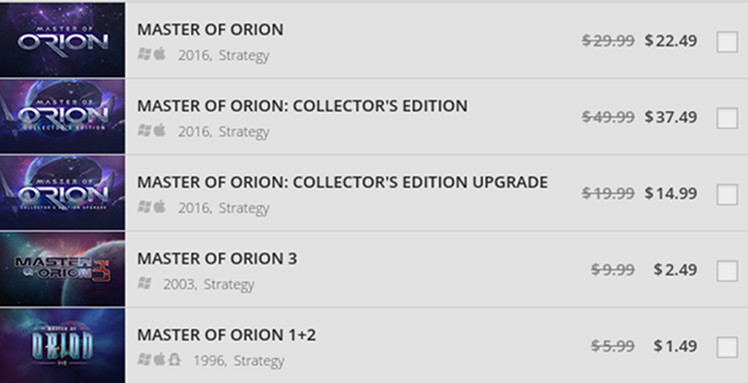Master of Orion, not Master of Product Bundling
Sunday, October 23, 2016
I'm not much of a gamer, but I recently followed a link to the video game store GOG (formerly Good Old Games). The site serves as a fantastic reminder that a firm's pricing power can erode very quickly - especially in the fickle consumer market. This fact is highlighted by this collection of games.
Imagine my interest when I saw Master of Orion advertised for purchase.

Many have derided the application's confusing title. You might be surprised to learn that Master of Orion was released more than a decade after Master of Orion III and nearly two decades after Master of Orion I (itself originally titled Master of Orion). While the naming system is quite confusing, I'm not going to focus in on that.
I'm not even going to mention that the pricing power for the more recent Master of Orion release is being artificially weakened by associating it (by name and proximity) with its much older and less expensive predecessors.
In all honesty, I'm more interested in the fact that the folks at GOG appear to eat at the same Mexican restaurant that I do.
| Action | Cost | Notes |
|---|---|---|
| Buy nothing | $0.00 | Risk-averse option. Customer is guaranteed not to receive a bad game. |
| Buy Master of Orion | $22.49 | The base game. Lowest price that can be paid in exchange for a playable video game. |
| Buy Master of Orion: Collector's Edition Upgrade | $14.99 | The expansion of the game. Requires purchase of the base game in order to be used. |
| Buy Master of Orion: Collector's Edition | $37.49 | The whole enchilada. Buyers spend a lot of money now and hopefully receive a game that they'll like. |
| Buy Master of Orion & Master of Orion: Collector's Edition Upgrade separately | $22.49 + $14.99 = $37.48 | The base game and the upgrade. Customers can purchase the base game now, and then buy the upgrade in the future. Also, 1¢ in savings. |
Gamers with high tolerances for risk often purchase bundles due to either exclusive content or pricing discounts, but neither is available in this case. So why would any rational buyer choose to purchase the bundle in this case?
A risk averse Master of Orion shopper could acquire the base game for $22.49. He could then play it and decide whether he wanted to purchase the expansion for an extra $14.99. Not only would this process save him money and reduce his risk of purchasing a game he didn't like, but it would also increase the liquidity of his savings.
Unless the process of upgrading the system is particularly difficult and time intensive, why would anyone purchase the bundled offering? And if the installation process is tedious or complex, why wouldn't the vendor make that fact clear? Unless there are some strange clauses between vendor and publisher, it's in the store's interest to sell the more expensive bundle.
So why did the GOG select this pricing scheme? I have absolutely no idea. It may have been an addiction to charm pricing. I suspect that it was simply an oversight that represents a lost opportunity for profit and customer expansion.
Looking for more than just my 2¢ on another company's 1¢? Why not contact me for a consultation?